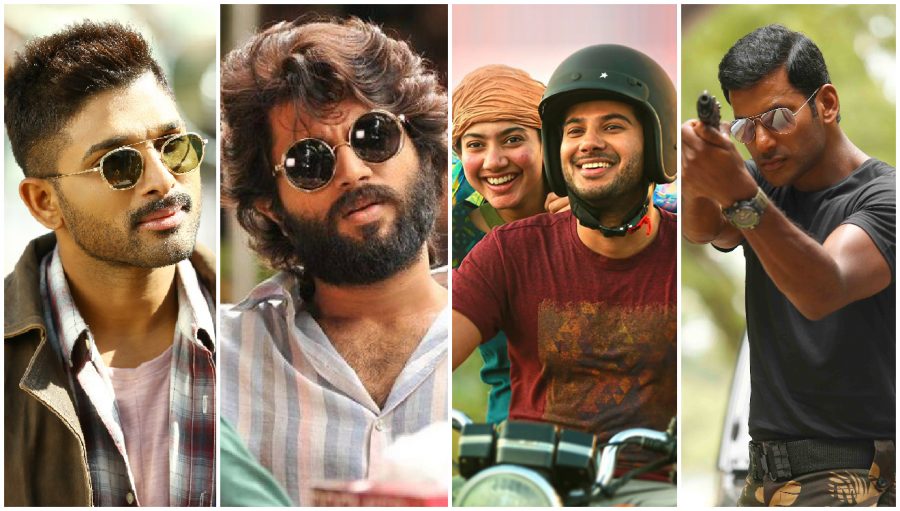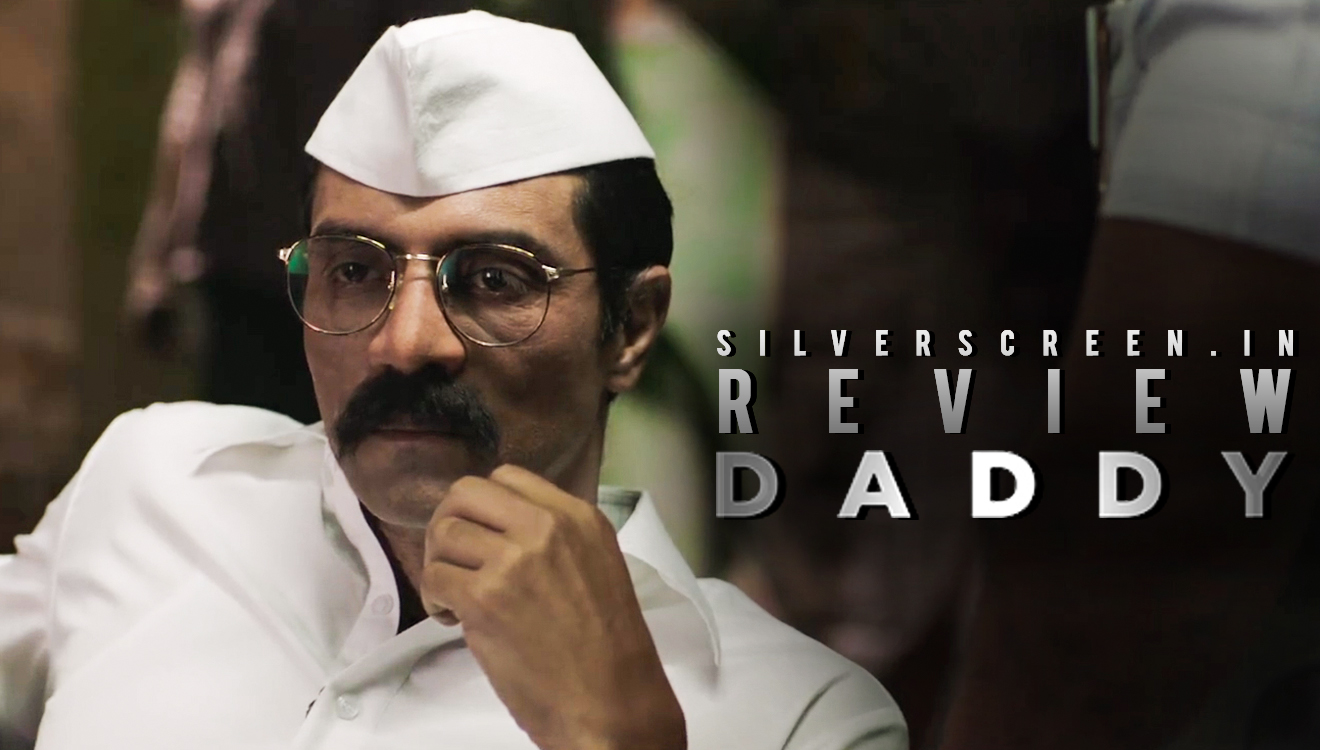What is common between Siddharth of Kali (2016), Arjun of Arjun Reddy (2017), Surya of Naa Peru Surya, Naa Illu India (2018) and Kathir of Irumbuthirai (2018)?
Rebellion without a cause, daddy issues and gratuitous violence, though the films choose to call it “anger”. In each of these films, anger is a key plot device. Anger defines each of these men. It is the Achilles heel of otherwise extraordinary gentlemen — Surya and Kathir are decorated soldiers, Arjun is a university topper and champion football player, Siddharth is worthy of Anjali’s great love. Anger is the story’s fundamental conflict waiting to be resolved. Overcoming that anger is the purported redemption arc.
Characters discuss the hero’s anger ad nauseam. Their loved ones nag them about their anger. Superiors reprimand them for their anger. The two angry Army men of Irumbuthirai and Naa Peru Surya are forced to seek psychiatric help for their anger. They are repeatedly warned that it is anger that will bring about their inevitable end.
Yet, the films themselves don’t take a critical view of the hero’s anger. The narrative is either from the point of view of the angry hero or positively on his side. After all, he is the ‘hero’. So, we are giving innumerable excuses for his angry outbursts.
We are told that his anger is merely a reaction to someone else’s attack. When we are introduced to the hero in Naa Peru Surya, he physically assaults a woman and threatens to keep her hostage until she apologises for insulting another man. A fight ensues. Surya emerges the brave hero. The film would have us believe that the woman started it with her insult. And that his angry reaction is justifiable, even if grossly disproportionate.
Anger, however, presents itself in only one form — mindless violence. The angry hero is quick to raise his hand, throw things, manhandle, even brutally beat an opponent and write it off as an expression of anger. In the trailer of Irumbuthirai, to visuals of a man holding a gun, a female voiceover asks, “Ungalukku konjam kovam adhigama varuma?” (Do you get easily angered?) As Kathir walks a subway squeezing a stress ball — that has a red angry bird on it — a male voiceover answers, “Avanukku kovam mattum than varum” (Angered is all he gets).
Siddharth’s emotional violence heaps on Anjali in Kali — she is worried, scared, helpless or anxious at nearly every scene in the film. Need I mention the scene where Arjun (Arjun Reddy) holds a knife to a woman who he’s violently undressing?
Yet, unlike the angry young men of the 1980s, they are not volatile anti-heroes whose circumstances made them so. They are not regular people with regular jobs whose life turns upside down because evil befell them. Their sister isn’t raped, mother isn’t murdered, their family isn’t attacked, their wife isn’t kidnapped. And the political establishment didn’t fail them or force them to go against the law to do the right thing.
There is, in fact, little to explain the uncontrollable anger and the gratuitous violence it manifests as among the millennial angry young men. We just have to accept the fact that it is a personality trait. This anger is not a result of something tragic that happened to a regular guy. The anger is the regular guy. Any reaction that isn’t angry and violent is treated as gross injustice to said sanctimonious character. Arjun Reddy says that if he had persevered in peace, he’d be felicitated for it. But “that’s not me. I don’t care”. Anjali sits at a salon smirking as she sees Siddharth seething in anger about his hair being cut — she didn’t expect any better.
On the other hand, there is also a disparaging view of anyone who isn’t easily angered. A controlled non-violent reaction to a perceived wrongdoing is mocked as complacency. “I won’t take it easy. If I do, it’ll become a habit. Not just in sports, but also in life,” Arjun proclaims. Everyone who speaks reason — like the friend who wants to present evidence to the dean in the scene — is portrayed as a comical interlude or a worthless loser.
Surya finds himself becoming a worthless loser during the 21 days of anger management challenge he has undertaken. He walks away from a site of murder, after witnessing the crime, because apparently that is what those who don’t get violently angry do. We are told that the only two options available — to a soldier, no less — are to deliver vigilante justice or stay mum while injustice occurs. By corollary, if one can’t bear the sight of injustice, one must wield the sword.
Yet, what or who they are angry at is unclear. Sometimes, it’s everything. “Arasiyalvaadhilendhu, allakkai varaikkum, oozhal, poraamai, panchayattu, kova padaama epdi irukka mudiyum?” (From politicians to every lickspittle, there is corruption, jealousy and kangaroo courts. How can I not be angry?) Kathir asks. Siddharth is angry at the drop of a hat — when a colleague pats his back, a child watches TV, a potential employer keeps him waiting, or even just when his pen stops writing.
At other times, it’s nothing. Like when a police officer asks Surya why he beat people, he says, “Because I got angry.” He is angry because he can be. Just like Arjun gets into fights because he can. “I am not a rebel without a cause,” he proclaims, as the background about subtly gives him a boost, immediately after arguing that he has no intention of explaining that cause.
Even though it appears that absolutely anything can trigger violent outbursts, I theorise that the anger is towards any sort of authority, anything that takes away their power to do as they please, lord over their land and people.
When Arjun is asked to apologise or leave the college, he chooses to leave — “I have no regrets”, he claims. Arjun Reddy is clear that at every stage in his life, he will do as he pleases and anything that comes in the way is worthy of the angry violence he wreaks on it.
Surya’s ambition in Naa Peru Surya is to literally lord over the land. He brutally murders a man in custody — one that the film calls a terrorist — because he believes that the nation wouldn’t do so. ‘Shut the gates’ is the war cry in Kali, the territory is marked, the common men gathered around, Siddharth wins the duel and orders his previously insulted friend to land the last punch. Arjun physically assaults the referee and closes the gates of the playground, to establish himself as the lord of the field and wage war. For him, “football is a violent sport,” so he protects his side of the field, like Surya perhaps protects his country.
This also extends to the people in their lives. When Preethi is upset about Arjun leaving for higher education, he snaps — how dare she express a feeling he doesn’t approve of!
The unfounded anger reeks of daddy issues. In Naa Peru Surya, a murderous soldier needs the ‘signature’ of his estranged father, who is a world-renowned psychiatrist, to return to work. In Arjun Reddy, an out-of-control surgeon wreaks havoc after he’s thrown out of his house by his father. In Irumbuthirai, a son lives a life rejecting the idea of debt because his father lived a life of shame due to his debt. It is almost as if their fathers broke their fragile little hearts and they are taking it out on the world.
Yet, we are to believe that the world is better for it. In the end, their anger saves the day and their violence saves lives. The restorative, climactic fight is to convince us all that their anger was justified all along and we must finally approve of it. The journey of redemption is not for them, but for those who misunderstood them — their family, the society and the audience.
After a film-long struggle to make Siddharth less angry, Anjali hands him the license to be violent in the end — righteous violence is necessary, she learns. After disowning his son for being angry, it is this passion (read: anger) that makes Surya an extraordinary person, his father learns. Arjun’s girlfriend waits for Arjun’s return, patient and pregnant. Kathir flicks his stress ball and gets his hands bloody by the end and the crowd is grateful for it. .
The millennial angry young man is the protector and the savior. We better get out of his territory or get in line!



